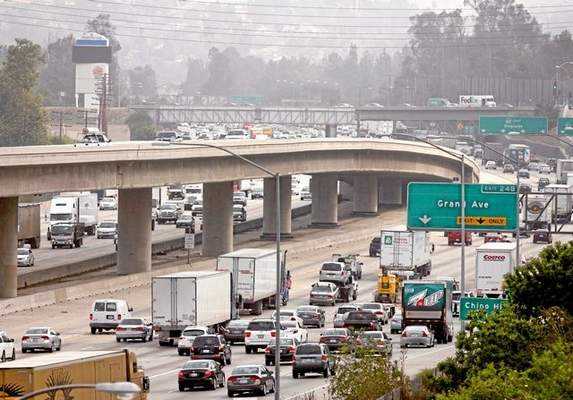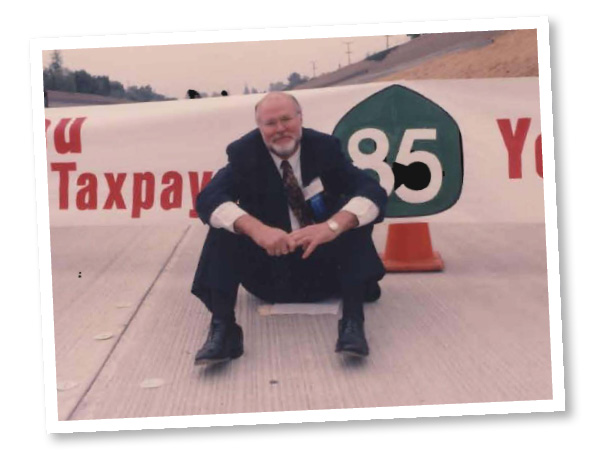
In his 2015 State of the State, Governor Jerry Brown challenged the state legislature to come up with a funding formula that is both fair and that creates a sustainable funding stream for the state’s transportation trust fund. While the federal government continues to struggle to fund the national seemingly-always-beleagured Transportation Trust Fund, California now has three competing funding measures on the table, including one that is backed by the state's Senate Republican Caucus.
With the gas tax, the main state source for transportation funding, in steady decline, Brown estimates a shocking $59 billion backlog in road repair projects. Add in the cost of road retrofits to support sustainable transportation, the drop in subsidies for transit operations, and the ongoing funding need to construct high speed rail, and you've got a massive shortfall. But we're not done digging yet.
To make matters worse, the state also has a debt because many of its largest projects over the years have been funded by bonds that create another headwind for any funding plan. Despite the new funds being generated by the state's cap-and-trade program, the debt and deficit are daunting.
So there's a need.
And, at least for now, there are three proposals on the table to address the need. Senator Bob Huff's office released a grid [PDF] outlining the proposals which is available on Scribd.
Assembly Speaker Toni Atkins wants to charge drivers about $52 a year, with the money going to road repairs. Atkins has yet to introduce legislation to implement the fee.
Senator Jim Beall has a track record of backing transportation funding legislation at the local level to fund highway construction and maintenance. Beall's proposed legislation would fund road maintenance through increased gas taxes and higher vehicle registration fees.
Senator Huff and the Republican Caucus are backing a Constitutional amendment to require that funds designated for transportation be used for that purpose.
The Republican legislation is the easiest to understand and could be the most popular with voters because it doesn't actually increase taxes. SCA 7 would re-allocate funds that were robbed from previous transportation funding measures back to transportation funding and would require voter approval.
This would create a $1.1 billion annual revenue stream for transportation and dedicate all future funds generated through gas taxes, mileage taxes, vehicle registration fees, and other transportation-related taxes and fees collected by the state for the state's transportation program. This, of course, also re-creates a hole in the state's general fund.
Huff rallied for this plan at an event at Diamond Bar this morning at the confluence of highways 57 and 60. This merge is listed as one of the worst freight bottlenecks in the country.
“The confluence is but one example of major transportation improvement projects that have been pushed back and delayed because the State Legislature continues to rob Peter to pay Paul,” said Senator Huff. “SCA 7 guarantees the transportation tax dollars we all pay are directed to California’s roads, highways, and bridges.”
The Senate Democrats have a competing plan, S.B. 16, introduced by Senator Beall. This plan raises fees by increasing the gas tax, vehicle license fee, vehicle registration fee, and the registration fee for zero emissions vehicles. Increasing all of the fees would raise a total of $4 billion. Unlike a constitutional amendment, the funds raised by Beall's plan could raided by the legislature, as it has done in the past.
“Senate Bill 16 solves a crisis that threatens our deteriorating streets and highways,’’ Beall wrote in a press statement. “California faces a $59 billion backlog in deferred maintenance that will grow by billions every year. Our cities and counties have a backlog of $40 billion in repairs. We must take action now."
“SB 16 will provide more resources for the state to repair the infrastructure under its jurisdiction and it also distributes millions to the local level. Counties and cities will get much-needed revenues to fix their roads."
The third plan, outlined by Assembly Speaker Atkins, would basically charge nearly every driver in the state $52. As noted, Atkins has not introduced legislation nor even publicly stated how the fees would be collected, whether through insurance companies or license registration.
The plan would raise $1.8 billion per year, $800 million of which would go directly into transportation. The rest would go into the general fund, the idea being that it would free up other transportation fees to go back to their original purpose: road repair.
“California cannot have a strong middle class or a thriving economy if our roadways are congested and people and goods cannot move efficiently throughout the state,” said Atkins in a statement. “The Assembly is stepping up and proposing $10 billion for transportation infrastructure—$2 billion per year over the next 5 years—starting in 2015-16.”
When Atkins proposed her plan in February, the response from across the aisle was cordial but hardly encouraging that a deal was around the corner. Assembly Republican leader Kristin Olsen (R-Modesto) released a statement to the Los Angeles Times stating, "There are funding options for our critical road improvements other than looking deeper into the pockets of Californians."
With the state's transportation funding situation reaching a crisis point, and help from the federal government not just around the bend, California is getting ready to go it alone. The first step, admitting you have a problem, has been taken. Now the two parties need to come together with a plan that puts enough money on the table to both pay for the projects of the future and payoff the debts of the past.






